Open sores that develop on the inside of the lining of your stomach and the upper part of the small intestine are usually referred to as peptic ulcers or stomach ulcers.
The main cause for the formation of ulcers in the lining of the stomach is an infection caused by the bacterium Helicobacter pylori. Stress and the frequent consumption of spicy food may worsen your symptoms and cause further discomfort.
Stomach ulcers can be treated effectively but it’s important to understand the symptoms you’re experiencing and identify the type of ulcer you have before following a suitable treatment plan.
What’s the procedure for diagnosing stomach ulcers?
Once you’ve consulted your physician, you’ll be subjected to a range of tests after examining your medical history. The tests you may have to undergo are:

Endoscopies are conducted to examine the upper digestive tract using a scope passed down your throat into your oesophagus, stomach, and small intestine. If an ulcer is detected, a biopsy may be performed to determine if H. pylori are present in your stomach lining. You may have to undergo an endoscopy if you observe signs of weight loss, bleeding, and difficulty in eating or swallowing.

Tests for H. pylori determine if the bacterium is present in your system. You may also have to undergo a blood, stool, or breath test to identify the presence of the bacteria. Breath tests usually provide the most accurate result as they may signify the presence of radioactive carbon in the form of carbon dioxide upon examination.

Upper gastrointestinal series, also known as a barium swallow test, is a series of X-rays that helps your physician get images of your oesophagus, stomach, and small intestine to identify any ulcers on the lining of your stomach.
What treatment measures follow the diagnosis of stomach ulcers?
Treatment of stomach ulcer symptoms in Australia will usually depend on what initially caused the open sores in your stomach. Certain medications may be used to reduce the discomfort of stomach ulcers:
Antacids that neutralise stomach acids
Acid blockers to reduce stomach acid production
Proton pump inhibitors to block acid production and promote healing
Antibiotics to kill H. pylori bacteria
If none of the treatment measures positively impact your overall health, it may be due to:
An infection that’s not H. pylori
Stomach cancer
Overproduction of stomach acid due to Zollinger-Ellison syndrome
Your physician will monitor your condition before suggesting different avenues of treatment measures if your system isn’t responding to the typical treatment methods that are used to treat stomach ulcers.

How can you prepare for a stomach ulcer diagnosis procedure?
Here’s how you can prepare for any of the tests that you have been recommended to take by your healthcare provider:
Make sure to inquire about any measures you have to take before attending a test to diagnose stomach ulcers, such as restricting certain foods or avoiding certain medications
Prepare a list of any medications that you’re taking for any pre-existing medical conditions that you may have
Note any symptoms you might be experiencing even if you think they might not be related to stomach ulcers

What questions can you ask your healthcare provider regarding stomach ulcer symptoms?

Once you’ve been diagnosed with stomach ulcers, be sure to ask your physician the following questions to be more informed of your condition:
- Is the condition severe or temporary?
- Is there a risk of developing additional health conditions due to stomach ulcer symptoms in Australia?
- Are there certain dietary restrictions that may help the healing process?
An experienced gastroenterologist can help you find relief from stomach ulcer symptoms in Australia
Dr Suhirdan Vivekanandarajah is a Sydney-based gastroenterologist and hepatologist specialising in providing expert medical care for gastrointestinal-related illnesses.
Schedule a consultation today for a professional diagnosis and suitable treatment plan.
